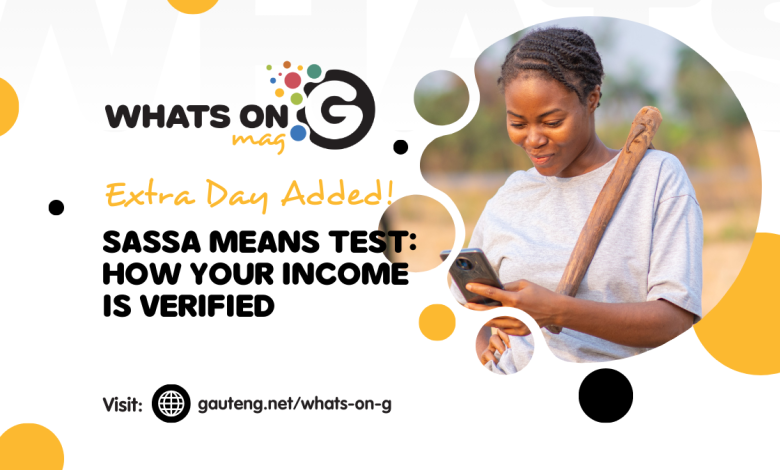SASSA Means Test: How Your Income Is Verified

For many South Africans, social grants serve as a vital source of financial support, but not everyone qualifies. The South African Social Security Agency (SASSA) uses a Means Test to assess applicants’ income and assets, ensuring that only those in genuine financial need receive assistance.
In this guide, we’ll explain how the SASSA Means Test works, what documents you need, and how to navigate the eligibility criteria.
What Is the SASSA Means Test?
The SASSA Means Test assesses the financial situation of individuals applying for grants. By reviewing an applicant’s income and assets, SASSA ensures that grants are allocated to those who need them the most.
Why Is the Means Test Important?
The Means Test prevents fraud and ensures that grants are distributed fairly. It helps SASSA allocate resources to applicants who meet the necessary financial criteria. This test applies to various grants, including the Old Age Grant, Disability Grant, Child Support Grant, and Care Dependency Grant.
How Does SASSA Verify Your Income?
SASSA uses multiple sources to verify your income and ensure that you meet the financial requirements for grants. The agency cross-references data from several trusted institutions. This process ensures that no income source goes unaccounted for.
Sources Used to Verify Income:
- Bank Statements: SASSA checks your bank statements for regular deposits and salary payments.
- Payslips: These documents show your monthly salary, which helps SASSA determine your income level.
- UIF and SARS Records: SASSA examines your Unemployment Insurance Fund (UIF) and tax records to confirm your earnings.
- Employment Data: The agency cross-references your employment records to verify the accuracy of the information you provided.
- Government Databases: SASSA uses several government databases to ensure the correctness of your income details.
Additional Income Sources Considered:
- Pensions
- Rental income
- Other government welfare payments or support
How Does SASSA Assess Your Assets?
SASSA doesn’t only verify income. It also considers your assets when assessing eligibility. If your assets exceed the established limits, you may not qualify for certain grants. However, SASSA does not take your primary residence into account when conducting the Means Test.
Types of Assets Considered:
- Savings and Investments: Bank balances, shares, or bonds are assessed.
- Property: SASSA considers any secondary properties, such as rental homes, but excludes your primary residence.
- Other Assets: SASSA also evaluates other valuable items such as cars, jewellery, and other assets that could generate income.
SASSA Means Test Thresholds
The income and asset thresholds vary depending on your marital status. These limits help ensure that grants are directed to those who truly need financial assistance.
Income and Asset Limits (Examples):
- Single Applicants:
- Monthly income: Cannot exceed approximately R12,300
- Assets: Must be below R1,056,000
- Married Applicants:
- SASSA considers combined income and assets, and the thresholds are higher for married couples.
These limits may change annually due to inflation or policy adjustments. Always check the latest requirements on the official SASSA website: SASSA Means Test Details.
Required Documents for the Means Test
You will need to submit various documents to prove your eligibility for a SASSA grant. These documents help SASSA verify your financial situation and assess your qualification for grants.
Required Documents:
- South African ID: To verify your identity.
- Proof of Income: Recent payslips or bank statements that show your earnings.
- Proof of Residence: Documents like utility bills or rental agreements to confirm your address.
- Additional Documents (If applicable):
- Medical reports (for Disability Grants)
- Birth certificates (for Child Support Grants)
- Adoption or foster care documentation (for Foster Child Grants)
What If Your Income Is Undefined?
If SASSA cannot verify your income or you fail to disclose it, your application could be delayed or rejected. Make sure you provide all necessary documents and notify SASSA promptly if your financial situation changes after submitting your application.
Common Grants That Require the Means Test
The following grants require the Means Test:
- Old Age Grant
- Disability Grant
- Child Support Grant
- Care Dependency Grant
However, some grants, such as the Foster Child Grant, do not require the Means Test. SASSA uses different criteria to determine eligibility in these cases.
The Importance of Periodic Reassessments
SASSA may periodically reassess your eligibility, especially if your financial situation changes. If your income increases or you acquire additional assets, you must notify SASSA. Conversely, if your financial circumstances worsen, apply for a grant promptly to prevent delays.
Check also: Can One Household Receive Multiple SASSA Grants in 2025?
The SASSA Means Test ensures that social grants go to those who need them most. By evaluating both your income and assets, SASSA can confirm your eligibility and prevent fraud. To avoid delays, make sure you provide accurate documentation and stay updated on any changes in your financial situation.
Ready to apply? Visit the official SASSA website for more information and to access the latest eligibility criteria and application forms: SASSA Application Portal.



